Transcript: Jordan least vulnerable to risk of sectarian divisions — King - By Adel Tarifi, Asharq Alawsat
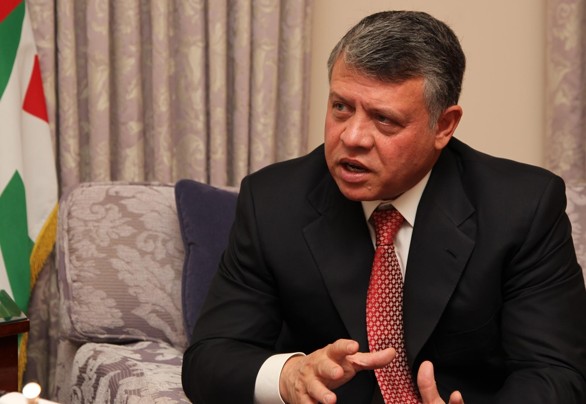
Following is the official translation of His Majesty King Abdullah’s interview with the London-based Asharq Alawsat Editor-in-Chief Adel Tarifi published on Wednesday:
Question: Your Majesty, the pressing issue for Jordanian national security is the fighting raging in Syria, involving more combatants, including Hizbollah, and reportedly Iranian support. How do you protect Jordan from this crisis’ repercussions?
King Abdullah: We were the first to warn against the danger that the crisis in Syria could degenerate into violence, after it started as legitimate, peaceful and demand-driven protest movements, which could have been absorbed before they developed from opposition into armed revolution that is gradually turning into a civil conflict with sectarian and religious ideological dimensions. Now it has become clear that the Syrian crisis might be growing from a civil war into a regional and ideological conflict of unpredictable magnitude and dire consequences.
I have always warned that it would be easy to export the Syrian crisis across borders due to the neighbourhood’s interweaving demographics. There seem to be attempts to escape from the crisis internally by turning it into a regional crisis. Those who are keen on the future of the region, its stability and the security of its people must put an end to the regional expansion of the Syrian crisis, which is spiralling and mounting. The situation requires solutions. Now is the time for more serious Arab and international coordination to stop the repercussions of the Syrian crisis, put a limit to them and stop any potential spillover. We are running out of time.
You have just asked what we are doing to protect Jordan from these repercussions. In fact, we are the least vulnerable to the risk of sectarian divisions and tensions due to the homogeneous makeup of Jordanian society — thank God for that — and the historical process of building a collective national identity. These elements have guaranteed that we never slipped into sectarian or ethnic conflicts throughout our history. However, we are the most vulnerable to the consequences of the refugee crisis, as the number of Syrian refugees in Jordan has exceeded 550,000 — which places us at the core of the Syrian crisis. But make no mistake, we will not allow anything to compromise our national security or harm our citizens, and we are capable of taking all necessary measures to safeguard Jordan. Experience shows how resilient we are when it comes to protecting our territory, and our armed forces are regionally and internationally acclaimed for their ability. Plus, our distinguished international ties have enabled us to secure technical assistance to boost our defence capabilities.
Our Jordanian people are aware of how serious and critical the current stage is, and of the security challenge posed by the Syrian crisis. I assure you that the deterrent to any external danger lies in our national cohesion, which we take pride in. Thank God, our internal front is united and is the key factor when it comes to protecting Jordan. For, each and every one of us believes that he/she is a partner in defending our homeland, its achievements and assets.
Q: How do you foresee the future of Syria in light of ongoing events — a united or a divided country?
A: A divided Syria means an open-ended conflict that would undermine the stability of the region and the future of its people for generations to come. Dividing Syria is not in anyone’s interest and tampering with Syria’s unity is a recipe for destruction. Let us discard these ideas and look to the ideal and logical solution, which we hope will be supported and translated into an initiative with an international political umbrella represented by the ongoing efforts to hold an international conference to implement the decisions agreed upon at the Geneva conference in 2012. This solution is: An immediate end to violence and the launch of an inclusive political transition process where all components of Syrian society are engaged — I repeat, all components of Syrian society — along with a review and reconciliation process and genuine political reforms that enjoy consensus among Syrians and are implemented by Syrians. The solution also entails the intensification of relief efforts inside Syria, so as to accelerate the return of refugees. Despite all the pain, blood, violence and destruction, I hope that reconciliation is still possible. It is the responsibility of all to safeguard the future of Syria and end the suffering of its people.
Q: Your Majesty, are there any direct contacts with the Syrian leadership, or advice offered somehow by virtue of geographical proximity?
A: Let me answer this question with another question: Do you see, in light of the official Syrian actions, any sign that they would accept advice from a country like Jordan, which believes in democracy and peace as the philosophy of governance and a way of life? Unfortunately, no. Advice is not heard when violence is embraced, despite our sincere attempts at the beginning of the crisis to extend a helping hand, offer advice and share lessons learnt, out of our concern for the Syrian people and keenness on their country’s territorial integrity, let alone good neighbourliness. All these were ignored. So, we had to resort to the media and diplomacy to send reminder after reminder of the danger of slipping into this vicious circle of violence, bloodshed and destruction.
The Syrian crisis is a major source of concern for Jordan’s diplomacy these days. It is at the core of my contacts and talks with international and regional leaders. There is hardly any meeting with any international figure during which I do not discuss the Syrian crisis, its repercussions and ways to solve it. It was front and centre in my recent meetings with the US president in April and British Prime Minister Cameron in London last week, and also my meeting in Amman with French President Hollande a few days ago. I recently discussed the issue over the phone with German Chancellor Angela Merkel, during my visit to Moscow months ago with President Vladimir Putin, and in all meetings during the many visits to Amman by Arab and foreign officials.
It is so painful for us to see Syria and its cities, the oldest in human history, morph into a patchwork of violence and hatred. It is painful to me and to all Jordanians to see Syrian blood spilled. The situation has deteriorated to a point where everyone, inside and outside Syria, should stand up and say: Enough.
Q: Syrian refugees have become a pressing issue. As you said in recent remarks, they now equal 10 per cent of the population. How do you deal with this issue economically? Is there assistance coming? Is Jordan willing to receive more if the fighting continues?
A: We are handling the Syrian refugee crisis in Jordan at the expense of our meagre available resources, which means that we cannot sustain this forever. There is undoubtedly considerable international appreciation for what Jordan is doing, and there is international and Arab aid, along with relief efforts and charity work, which are all appreciated. However, the size and level of assistance does not meet the actual and growing needs of the Syrian refugees.
Jordan is shouldering a huge burden, with mounting pressure on infrastructure and natural resources, especially water and energy and, more importantly, the shocks caused by the refugee influx to the national economy, including distortions in the labour market, where the refugees are competing for jobs with Jordanians, not to mention the impact on education and healthcare. I have just referred to a plot to turn the Syrian crisis from an internal into a regional issue. Countries interested in supporting moderation and stability should not leave Jordan and other sisterly countries to face these plots alone.
Again, international and Arab relief efforts are appreciated. In fact, the UN has recently issued its largest appeal in history, but the solution does not lie only in relief work, but also in productive political action that leads to an end of violence and the return of Syrian refugees.
When some voices were raised internally objecting to the influx of brotherly Syrians, the response came from a humanitarian perspective: How can we close the border in the face of a woman carrying an infant and fleeing under shelling? What I fear is finding ourselves in a difficult situation where, God forbid, we cannot provide relief to our brothers and sisters, the Syrian refugees seeking a safe haven in Jordan. That would mean that efforts to export the Syrian crisis have succeeded. We should not allow this, for humanitarian and political reasons. Relief efforts and support should not relapse, nor should political pressures to find an inclusive, comprehensive and political transitional solution.
Q: Your Majesty, well before all these political storms, you warned of a “Shiite Crescent”. Do you feel that it is happening now? In your opinion, how can the region avoid such a trap?
A: What I have warned against in the past was a political hegemony by a grouping of countries based on religious ideological grounds, and not Shiitism as a religious doctrine. The issue is about exploiting religion and the madhhab as a means to achieve political purposes. Islam is way above that and too noble to be used as a means to gain power and cause divisions.
We cannot remain silent over attempts to tamper with the destiny of the region and its peoples by exploiting religion and religious schools for politics and use them as a means to divide people. In this context, I should warn that fanning the fire of sectarianism in the Arab and Islamic worlds will have devastating consequences for generations to come and on the entire world. The sum of all fears is that the Syrian conflict could expand into a fitna between the region’s Sunnis and Shiites.
Compared to other religions, God has blessed us throughout our Islamic history and spared us sectarian fitna. But we are now facing a situation where both Sunnis and Shiites believe that a devastating sectarian war in Syria is inevitable. If we leave both sides to their conviction that what is happening in Syria is basically a jihad in principle, the conflict and the fighting will drag on endlessly towards full destruction, because Sunnis and Shiites will be there till Judgement Day. What is happening in Syria is, in fact, a sectarian ideological revenge, Sunnis standing up for Sunnis and Shiites for Shiites. This is a very important issue that should be borne in mind. If we succeed in ending the strife and bloodshed in Syria and reaching an inclusive transitional political settlement, Sunnis and Shiites in the country can reconcile and coexist in the future, and thus we can preserve Syria’s territorial integrity and the unity of its people.
As a Muslim and a Hashemite, it is my historical responsibility to work with all my power with the rational in the Arab and Islamic worlds to prevent a blind fitna and urge politicians and clerics not to incite people, sow sedition and exploit religion for political purposes. All should remember that we, as Muslims, are united by our belief in God, His angels, books, messengers and Judgement Day. Our beliefs in these are larger than our differences over historical issues. This is the central point we sought to clarify through the historic consensus over the key aspects of the Amman Message, especially the Ummah’s universal consensus on prohibiting the labelling of other Muslims as infidels.
Jordan believes in dialogue as a way to reach conciliation and concord over all regional problems. Each one of us should think about the future of their children and grandchildren. There is no room for sectarian and religious division that throws the region into a cycle that no one knows where it leads. We all have to summon our courage and wisdom and measure up to our historical responsibility. God says in the Holy Koran: “And hold fast, all together, by the rope which Allah (stretches out to you), and be not divided among yourselves.”
Q: Your Majesty, Jordan has recently held elections that were boycotted by the Muslim Brotherhood and a new government was formed. Does this boycott bother you?
A: I really regret that any political force would boycott productive and constructive political action through which it can represent its voters, present its platforms and participate in legislation, decision making and the rotation of governments. This is particularly true when the boycott is decided by a political movement like the [Islamic] Action Front, which is historically known for its wisdom and rationality.
However, the latest elections and ensuing parliamentary consultations that led to the formation of the government are an experiment and a step on the path of democratisation and entrenchment of the parliamentary government approach, with all the lessons it entails and the experience we gain from such an experiment. Our society is heading towards democracy and active citizenship. Several frameworks and channels for expression, representation and democratic empowerment are in place, either directly through the Lower House and civil society, or through the media and collective or individual voluntary work. We are also moving towards municipal elections and all will have a new opportunity to participate and express their views and shoulder the responsibility of representing the people. I hope that a spirit of participation and willingness to effect positive change will prevail and that boycott calls, negativity and scepticism will subside.
Q: In a discussion paper you have published recently, you talked about building a democratic model and reaching parliamentary government. How long do you estimate that will take?
A: If the question is about my personal desire to reach a full-fledged parliamentary government as in established Western democracies, I would say: Today, rather than tomorrow. But reality suggests otherwise. We could have made some cosmetic reforms and stopped at appointing MPs as Cabinet members to claim that we created a full-fledged parliamentary government, leaving power and decision-making structures untouched. But I am not for momentary media and political victories. I am for genuine reform that involves all segments of society and that, at one point, will speak for itself when an efficient and a full-fledged parliamentary government emerges.
I would like to ask, in turn: How long did it take Spain to achieve democratisation? How long did it take Britain, France and the US to reach their current democratic status? What did these nations do on the road to democracy? How many pieces of legislation did they enact, how many parliamentary cycles did it take, how many constitutional amendments did they introduce? How many democratic institutions did they establish? How many times did they go through a relapse that was corrected by civil society and civic forces that believed in their responsibility to participate? How does the map of political parties and spectrum look like in these countries? How did political parties develop their platforms through history, until political representation was finally achieved through political parties and partisan platforms?
Often, when we get carried away in our enthusiasm for democracy, which I staunchly advocate, we forget the essential details that we need in order to build successful and sustainable democratisation.
The entire issue hinges on specific democratic, legislative, institutional, political, economic and social achievements. When society achieves these, democracy will become a reality and a way of life and a parliamentary or representative government will emerge automatically as its details are linked to the nature of the political system.
The final say regarding reform and democracy is the people’s, as a whole, and I am one of them. Reform starts with each and every one of us.
I do not want to elaborate too much on socio-economic transformation theories. What I want to stress, however, is that we, in Jordan, are doing our utmost to provide all elements of democratisation, including constitutional institutions that guarantee the political process and pluralism, progressive and fair legislation, checks and balances, separation of powers, a vibrant civil society and real, platform-based parties that make it to Parliament and form governments on the basis of a parliamentary majority and a constructive opposition.
In their entirety, these elements result in democratisation. They need a majority of society to believe in them so that we can embark on translating them into facts on the ground, exhibiting, as citizens, enough awareness of the importance of political participation and the need to change election habits and representation, so that it becomes based on political parties and platforms.
As for my convictions and role, I see no alternative to democracy, in its various shapes and forms, as our approach to governance and mechanism to expand decision making. The date of achieving reform is linked to the accomplishment of the democratic milestones and requirements I just mentioned. I took an oath upon myself, when I assumed my constitutional powers, to contribute as much as I could to making Jordan more democratic. It is a responsibility I inherited from my father, Al Hussein, God bless his soul, and I will pass on to my son, Al Hussein. It is the responsibility of responding to the aspirations of the people, leading the transformation process and adapting to developments.
Q: Your Majesty, the entire world is suffering from economic crises that affected investment flow. How does Jordan deal with the challenges of creating jobs and attracting foreign investment?
A: Without a doubt, responsible countries that are committed to their social role have to exert more efforts at difficult times to protect the more vulnerable segments of society, ensure essential levels of growth, build on available opportunities and adapt to new situations to regain prosperity as soon as possible. Where there are challenges, there are always opportunities. We, in Jordan, are exerting every effort to protect and stimulate the national economy, empower the social segments most susceptible to the repercussions of regional and international economic and political crises that are beyond our control.
The socio-economic approach in Jordan always seeks to invest in the citizen to enhance our competitiveness. We are relentlessly working on that, building on the positive indicators that distinguish our qualified workforce. Despite the economic crisis, we have, thank God, and thanks to citizens’ awareness, introduced a set of measures to remain on the right track. As a result, we are witnessing economic growth, against all odds.
Regarding job creation, we believe that continued public-private sector partnership and support for entrepreneurship are the best means to create sustainable jobs for Jordanians. We have also directed the government to focus on development in the governorates. One of the tools to achieve that is the Governorates Development Fund, which was established to secure the necessary financing for job-generating and productive projects in the Kingdom’s governorates, where there is a young labour force. The aim is to improve citizens’ living standards and realise a tangible and direct improvement in quality of life. The government will benefit from the assistance provided by the Gulf Cooperation Council to finance a number of development projects in the governorates, out of the keenness of our brothers in the Gulf to support Jordan’s development efforts, and to that we are grateful.
As for attracting foreign investment, Jordan, thank God, still enjoys the confidence of investors from various countries despite the regional circumstances. Over the past decade, the Kingdom has worked on implementing measures and legislation to encourage and facilitate investment. Examples of that include several free trade agreements that have made Jordan a gateway to the most important global markets. We have also established a number of development zones in various governorates, based on the competitive edge of each and aimed at making these areas attractive to investors. The government and the legislative authority are currently working on developing the new Investment Promotion Law and drafting a new law to govern public-private partnership to enhance the country’s competitiveness.
Q: Your Majesty, during his latest tours of the region, US Secretary of State John Kerry gave the impression that there is hope for Palestinian-Israeli peace. Do you think that this is possible, in light of the political turbulence in the region and the Palestinian-Palestinian divide? How can Jordan help make peace?
A: Jordan is essentially concerned with making peace in the region because peace is in our higher national security interest, and not as a mediator or a facilitator. Regional turbulences are a main drive to accelerate peacemaking because a stalemate in peace efforts would cause an explosion in Palestinian-Israeli ties in a sort of Arab Spring-like protests, taking the form of either a new Intifada or a cycle of violence and counter violence resulting from the loss of hope for the two-state formula and the emergence of a one-state reality where Palestinians are persecuted. This would trigger a popular revolution venting the injustice the Palestinians have been historically subjected to. There is a genuine need to solve the conflict based on the two-state vision that leads to the establishment of an independent, sovereign and viable Palestinian state on Palestinian soil, within pre-June 1967 lines and with East Jerusalem as its capital.
I think that Secretary of State John Kerry is working hard and realistically, away from the spotlight and media commotion, to bring the points of view closer and suggest workable solutions to thorny files, especially since relaunching direct negotiations means embarking on talks over final status issues such as Jerusalem, refugees, borders, security and others. These are complex issues that require historic and workable solutions that guarantee a just, comprehensive and sustainable peace for future generations. We are looking forward to considering what Mr Kerry will suggest during his current visit to the region.
As for us in Jordan, we are effectively contributing to creating a positive atmosphere that can help the Palestinians and the Israelis return to direct negotiations and seize the available opportunity to make peace before chances for the two-state solution fade away, due to the changed reality on the ground, especially as a result of settlement activity that is swallowing the lands of a future Palestinian state. Settlements, which are deemed illegal by the entire world, are the major obstacle to peace and the two-state vision.
The Arab Peace Initiative provides a historic opportunity that Israel should seize before it is too late to make peace with the Arab and Islamic worlds. What is on the table today might be a missed opportunity tomorrow.
Q: But, Your Majesty, don’t you think that this positive role Jordan is trying to play is being opposed by Israel, as shown by the negative remarks by the Israeli premier on the Jordanian-Palestinian agreement that enroots your historical role to protect the holy places in Jerusalem?
A: There is a historical and legal context to this agreement. It aims at updating the legal framework of the Hashemite custodianship of Islamic and Christian holy sites in East Jerusalem, in line with the new legal status of the Palestinian state. The agreement, as far as I am concerned, is the banner for the religious, moral and historical responsibility I have as a Hashemite, a responsibility that I inherited from my forefather Sharif Hussein Bin Ali, who undertook the first Hashemite renovation at Al Haram Al Sharif. This responsibility cannot be fulfilled through futile media battles, but rather through real action to support the steadfastness of our brotherly Jerusalemites at the political, economic, social, services and education levels. It also entails securing international protection for East Jerusalem as home of civilisation and human heritage and preventing any attempts to jeopardise its historical identity and freedom of worship by imposing a new reality on the ground that seeks to erase its Arab, Islamic and Christian identity. The most significant element in this equation is supporting the brotherly Palestinians in their struggle for an independent Palestinian state and exerting efforts in international forums to apply international pressure on Israel and place it before its responsibilities as an occupying state. These are our historical responsibilities and no one will prevent us from fulfilling them.
Q: Your Majesty, how do you assess your relations with Saudi Arabia and Arab Gulf countries? How far has the project of Jordan’s accession to the GCC gone?
A: I would like to express pride in my brotherly relations with the leaders of the Arab Gulf states. Jordan has historical ties with our brothers in these countries, especially the brotherly Kingdom of Saudi Arabia. The advanced levels reached in our mechanisms of coordination and to ensure closeness in our stances reflect my deep relationship with my brother the Custodian of the two Holy Mosques Abdullah Bin Abdul Aziz Al Saud, who has been championing groundbreaking efforts to enhance Arab solidarity and joint action.
There are constants for this relationship, foremost of which is our absolute belief that the national security of the Arab Gulf countries and Jordan’s are inseparable. That makes us firmly believe that the security of our brothers in the Gulf is an integral part of our national security. Recent events and regional tensions have proven the importance of coordination and consultation and highlighted the historical bonds between Jordan and the Arab Gulf states, in light of the geographic and strategic depth we are to each other. This requires continuous harmony in our positions on regional and Arab issues to protect our common interests.
Regarding accession to the GCC, it is aimed to put such historical ties within the framework of a stable and cohesive regional system. What we are keen on is to enroot our ties with the GCC countries at all levels: Political, economic, military, security and cultural, among others. Such relations should be based on solid foundations of complementarity, so that Jordan can enjoy an advanced status in its partnership with Arab Gulf states.
Q: Finally, how does Your Majesty see the region’s future?
A: The ambition is for the Arab region to reach an advanced state where economic prosperity and democracy prevail, along with genuine respect for the Arab individual and his/her dignity. These have been the core demands of the Arab peoples’ Spring.
We should not give up hope, despite all challenges and difficulties. Serious efforts should continue to achieve reform, restore stability and relaunch growth. All countries and communities that have undergone similar circumstances in history responded to challenges by doubling their work and clinging to hope for a better future. This is what Jordan believes in as it adopts an evolutionary pluralistic approach to reform, away from chaos and from leaps into the unknown.
Latest News
-
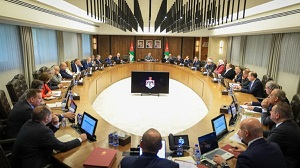 Cabinet suspends mandatory retirement rules, approves funding measures
Cabinet suspends mandatory retirement rules, approves funding measures
-
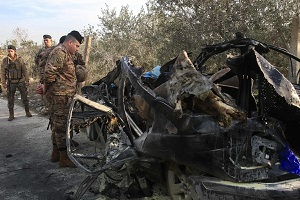 Lebanon state media says 3 killed in Israeli strike on vehicle near Sidon
Lebanon state media says 3 killed in Israeli strike on vehicle near Sidon
-
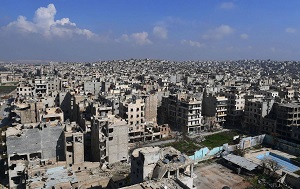 Syria State Media Says Kurdish Force Shelling Kills One Person in Aleppo City
Syria State Media Says Kurdish Force Shelling Kills One Person in Aleppo City
-
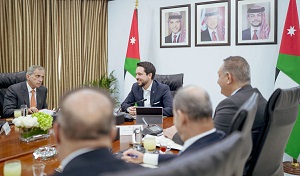 Crown Prince chairs meeting to review programme on combating littering
Crown Prince chairs meeting to review programme on combating littering
-
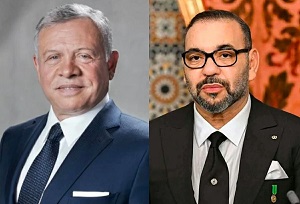 King congratulates Morocco monarch on football team’s 2025 Arab Cup win
King congratulates Morocco monarch on football team’s 2025 Arab Cup win